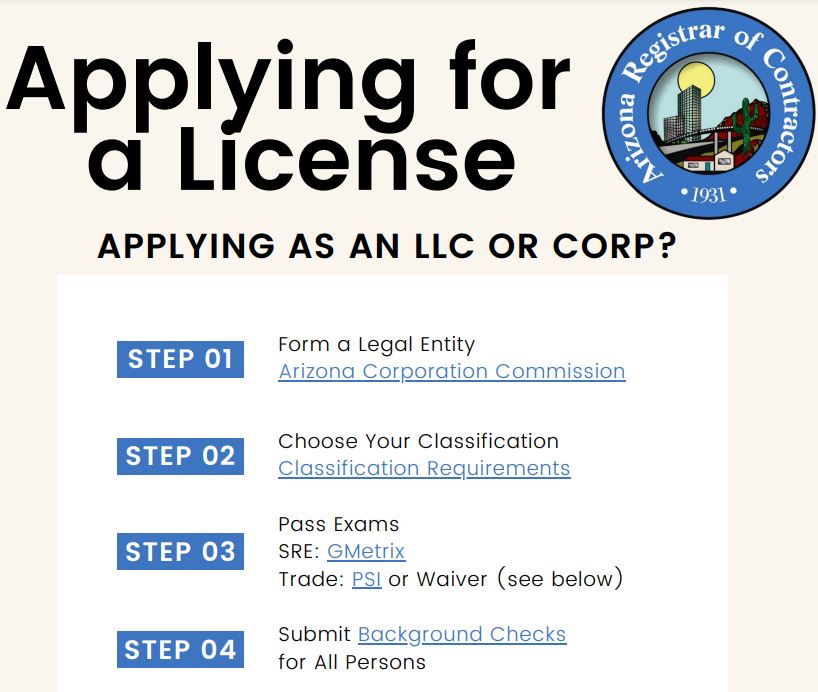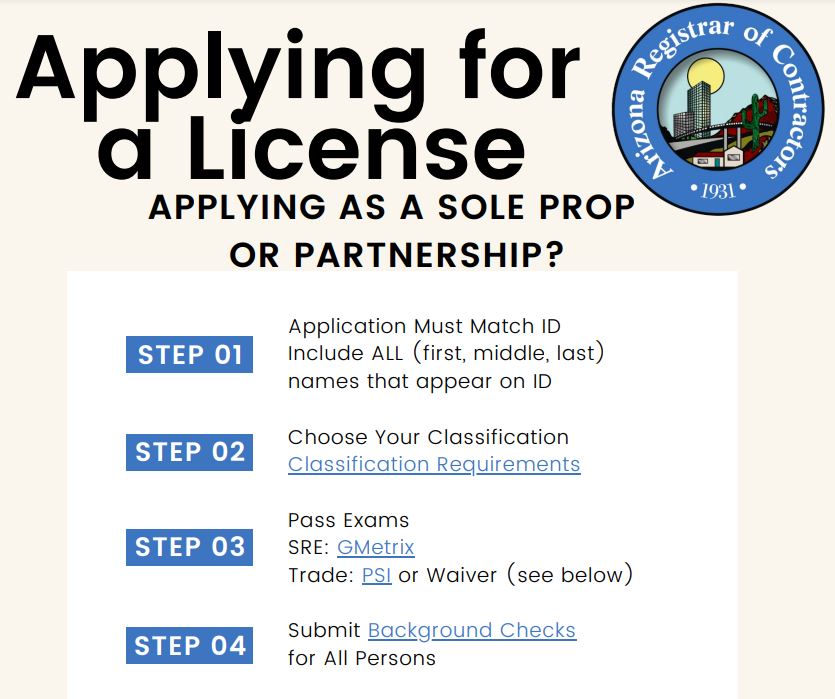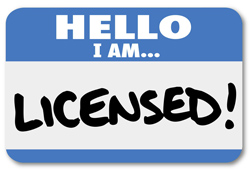Applying for a License
Click on one of our easy to follow checklists and watch our Applicant Education Seminar below to learn more about the application process.
Applying for an Arizona Registrar of Contractors' license? Need help with your application?
We offer a free online Applicant Education Seminar that walks you through the application process. Click the video below to watch our last seminar or click on register to sign up for an upcoming session.
Seminario Educativo para Solicitantes (Virtual)
¿Quiere convertirse en un contratista autorizado en Arizona? Regístrese para el próximo Seminario Educativo virtual para solicitantes.
¡Unase a nuestro curso de preparación, en el cual recorremos el proceso de solicitud, de principio a fin. Durante el curso, tendrá la oportunidad de presentar cualquier pregunta que tenga sobre el proceso de solicitud para ser contratista autorizado en Arizona!
Getting a Contractor's License
On this page, you will find a simple overview of the steps you must take to get a contractor's license from the Arizona Registrar of Contractors. If at any time you have a question and the answer is not provided below, give us a call at 877.692.9762 or email the Registrar of Contractors Licensing staff at [email protected].
The Registrar of Contractors is now offering free virtual Applicant Education Seminars, in English and Spanish, where applicants can learn about the application and get their questions answered. You can also find some short videos on our YouTube page, which will explain common mistakes that delay applications from getting approved. We encourage you to view the videos before starting your application.
- Identify a Qualifying Party
The Applicant must identify a Qualifying Party for the license. "Qualifying Party" means a person who is regularly employed by the licensee and is actively engaged in the classification of work for which the person qualifies on behalf of the licensee.
The Qualifying Party may be a sole proprietor, one of the partners of a partnership, one of the members of a limited liability company, one of the officers of a corporation or an employee of the contracting business.
The Qualifying Party must have the necessary experience, knowledge and skills to supervise or perform the contracting work. The Qualifying Party must meet or exceed the license classification requirements for the license classification for which they are applying.
A Qualifying Party is a regularly employed person with the necessary experience, knowledge and skills as defined under A.R.S. § 32-1122(E). - Pass Examination(s)
The Qualifying Party must pass the required examinations by at least 70% and submit the exam results. The Qualifying Party must complete the AZ Statutes and Rules Training Course and Exam (SRE). The Qualifying Party must also complete a specific trade exam, unless eligible for a waiver.
- Statutes and Rules Exam (SRE)
The SRE is a computer-based open book training course and exam that is only offered online through Gmetrix. For assistance with SRE login, course navigation and system requirements contact Gmetrix at 801-323-5800 or email [email protected].
- Trade and Solar Exams
- Trade and solar exams can be taken either online or at a testing center through PSI Services.
- If you need to contact PSI Services about your trade exam, please call 855-744-0310 or email [email protected].
- Information about all of the required exams (including cost, how to schedule, links to trade-specific content outlines, and study materials) can be found in the PSI Candidate Information Bulletin.
- NASCLA
Applicants for the KB-1 Dual Building Contractor and KB-2 Dual Residential and Small Commercial license classifications may take the National Association of State Licensing Agency Commercial General Building Exam in lieu of the AZ ROC trade exam. The fee for these exams is $106 plus the $25 application fee. The application fee is paid directly to NASCLA and the examination fee to PSI Exams Online.
Applicants for the CR-11 Electrical, C-11 Electrical, and R-11 Electrical license classifications have the option of participating in the National Association of State Licensing Agency Electrical Examination Program in lieu of taking the AZ ROC trade exam. The fee for these exams is $116 and is paid to PSI Exams Online directly.
The NASCLA Accredited Examination Program was designed to reduce redundant licensing requirements and assist contractors who need to be licensed in multiple jurisdictions. For more information on the benefits of taking the NASCLA exam instead of the AZ ROC trade exam visit NASCLA's website.
- Exam Updates
AZ ROC has reorganized several exams. The knowledge needed for these classifications remains the same. Which classification you apply for will depend on the scope of work you plan on doing and the experience you already have. You must meet the minimum experience requirements in order to apply for the classification.
If you have already taken and passed one of these exams before they were combined, as long as the exam was taken within two years of applying for the classification that matches the exam, the test will be accepted. You must apply within that two year time-frame. The B, B-3, CR-61 exams have been combined into one exam. Whichever of those classifications you want to obtain, you will take this new combined exam. The B-1, B-2, KB-1, KB-2 exams have been combined into one exam. Whichever of those classifications you want to obtain, you will take this new combined exam.
Please refer to the ROC's classifications page for complete descriptions of these classifications. https://roc.az.gov/license-classifications
The Qualifying Party's original AZ Statutes and Rules Exam results and trade exam results should be submitted with the application. If you are attempting to waive the trades exam, a completed waiver form may be submitted for review with the application.
- Submit to Background Checks
You must obtain a background check for every person named on the License Application Form through our background check vendor. Click here to learn more and to submit a background check. Background checks expire 90 days from the completion date.
If you currently or in the past have had an international address, you must submit an International & Domestic background check. You must list the addresses both foreign and domestic where you have resided. Once the background check has completed you will receive an email from AccusourceHR with your completed report. If you have any issues or questions on submitting a background check, please email [email protected] - Form a Legal Entity
LLC's and corporations are required to register with the Arizona Corporation Commission. Partnerships are required to register with the Arizona Secretary of State.
In Arizona, a license may be issued to a sole proprietorship (individual), a partnership, limited liability company or a corporation. To learn more about creating the appropriate entity for you and obtain the required documentation, visit the Arizona Corporation Commission's eCorp website for additional information.
Upon issuance, you can only contract and advertise with the entity name the Registrar has licensed, which is the name indicated on the application. The entity, for various reasons, may desire to operate under a secondary name (Doing Business As) which is where the DBA comes in. If you would like to include a DBA, you may indicate that name on the application in the designated place. It is recommended but not required that you file the DBA trade name with the Arizona Secretary of State. - Bond
The applicant must obtain and submit proof of a license bond.
For information on determining bonding requirements and to download a comprehensive list of all businesses licensed to offer surety products in this State by the Arizona Department of Insurance, visit our bond information page. - Fees
Include the required fees and assessments with your License Application form.
- Provide Government Issued Identification
Every individual named in Part 3: Persons in this License Application must submit a legible copy of a government issued photo identification with the application. Acceptable forms of identification include a valid driver's license or passport.
- Complete and Submit an Application
Complete and submit a License Application Form to the Registrar using one of the following methods:
• Use the Online Customer Portal to fill out and submit the application.
• Mail this application to: Registrar of Contractors, P.O. Box 6748, Phoenix, AZ 85005-6748
• Deliver this application to: 1700 W. Washington Street, Suite 105, Phoenix, AZ 85007-2812
Supporting Documents:
- Prior License Disclosure Forms
If any person named on the License Application Form was named on a prior license, complete and attach a Prior License Disclosure Form for each person. Also include forms and documentation of disciplinary resolution, if applicable.
- License Cancellation Forms
If you currently have a license that you wish to cancel upon the issuance of a new license, complete and attach a License Cancellation Form.
- Felony Disclosure Forms
If any person named on the License Application Form was charged with or convicted of a felony, complete and attach a Felony Disclosure Form for each person.
- Unlicensed Activity Disclosure Forms
If any person named on the License Application Form was convicted of unlicensed activity, complete and attach an Unlicensed Activity Disclosure Form for each person. and documentation of remedial measures.
General Requirements
- Who can apply for a contractor's license?
A sole proprietorship (individual), a partnership, limited liability company, or a corporation may apply for a contractor's license if they have a regularly employed person with the necessary experience, knowledge and skills who serves as the qualifying party. All persons listed on the application must be 18 years of age or older.
A corporation or limited liability company must be registered with the Arizona Corporation Commission and in good standing with that agency before submitting an application for a contractor's license. The corporation or limited liability company must remain in good standing in order to renew their contractor's license. - Who is responsible for contracting activities?
All persons listed on the license are responsible for the contracting activities of the business. "Person" means a qualifying party, an owner, any partner of a partnership, all members of a limited liability company, and any officer, director or owner of 25 percent or more of the stock of a corporation.
- Who must be licensed as a contractor?
Any business which contracts or offers to contract to build, alter, repair, add to, subtract from, improve, move, wreck or demolish any building, highway, road, railroad, excavation or other structure, development or improvement, or to do any part of the work must be a licensed contractor.
Also included in work requiring a license is the erection of scaffolding, connections to utility service lines, metering devices and sewer lines, mechanical or structural service to a structure or improvement and any other work in connection with the project.
"Contractor" includes subcontractors, floor covering contractors, hardscape contractors and consultants representing themselves as having the ability to supervise or manage a construction project for the benefit of the property owner.
Supervision or management includes hiring and firing of specialty contractors, scheduling of work on the project, and selection and purchasing of construction material.
Contractors must be properly licensed before submitting bids. - To whom is the license issued?
A license may be issued to a sole proprietorship (individual), a partnership, limited liability company or a corporation. The license belongs to the business and not to the qualifying party.
Waiver of Trade Exam
What is examination waiver?
Passing a trade examination is one of the requirements necessary to be approved for a contractor's license. A trade examination helps the Registrar of Contractors assess whether an applicant has the knowledge required to perform the type of work authorized by a license. However, pursuant to R4-9-106(E) the Registrar may waive the trade exam requirement if the qualifying party is currently or has previously been a qualifying party for a licensee in this state or another state in the same classification, or a comparable classification as determined by the Registrar, within the preceding five years.
* You must apply for a trade exam waiver by including the Application to Waive a Trade Examination with your completed license application. The Registrar does not pre-approve trade exam waivers prior to license application
* The AZ SRE Statutes and Rules Exam cannot be waived because it has reference to Arizona specific statutes and rules.
Qualifying Party
To whom does the term "qualifying party" refer?
The "qualifying party" means a person who is regularly employed by the licensee and is actively engaged in the classification of work for which the person qualifies in behalf of the licensee.
The qualifying party must have the necessary experience, knowledge and skills to supervise or perform the contracting work.
Who can be a qualifying party?
The qualifying party may be a sole proprietor, one of the partners of a partnership, one of the members of a limited liability company, one of the officers of a corporation or an employee of the contracting business.
What is the qualifying party required to do?
- They are the responsible managing employee.
- While engaged as a qualifying party for a licensee, the qualifying party shall not take other employment that would conflict with his duties as qualifying party or conflict with his ability to adequately supervise the work performed by the licensee.
Can the same person serve as the qualifying party for more than one entity?
Per A.R.S. § 32-1127, a person may serve as the qualifying party for one additional entity if one of the following conditions exists:
- There is common ownership of at least 25% between each licensed entity.
- One licensee is a subsidiary of another licensee for which the same person acts in a qualifying capacity. "Subsidiary" as used in ARS 32-1127(2) means a corporation of which at least twenty-five percent is owned by the other licensee.


